#VolkswagenAtlas
With Rising Sales and Two Crossovers on the Way, Volkswagen of America Can Probably Breathe Easy
The diesel emissions scandal that continues swirling around Volkswagen’s German workforce is merely a far-off cloud for the folks at Volkswagen of America. Sunny skies reign, thanks to a decision to go heavy into “Americanized” crossovers.
Sure, the Jetta and Golf families continued their downward trajectory, joined in the descent by VW’s Passat sedan, but those lost sales are more than made up for by two nameplates: Tiguan and Atlas. Break out the iced tea.
Fewer Seats, More MPGs: Volkswagen Debuts Atlas Cross Sport in New York
Regardless of where we think Volkswagen’s true strengths prevail, the company is dead set on electrification. Granted, much of this is the direct result of the diesel emissions fiasco. But it doesn’t appear to be solely interested in providing lip service to an angry public; it wants to build these cars and it really wants you to be excited about that.
The brand’s current lineup doesn’t include much in the way of electrics, e-Golf notwithstanding, but CEO Matthias Mueller has promised to unveil a new EV “virtually every month” as its multi-billion-dollar investments into new battery technologies and charging infrastructure begins to bear fruit. In the meantime, we’ve grown accustomed to seeing VW parade a steady stream of electric concept vehicles. Normally, these are part of Audi’s e-tron lineup or the VW’s new I.D. sub-brand. However, the electric push has started spilling over into the core brand, and the latest product is more than just a battery-driven green machine. It feels tangible, like it might be meant for everyone — not just EV enthusiasts.
Volkswagen’s Atlas is a relatively spacious three-row, midsize crossover — fairly fuel efficient for its size, but not a hoot to drive. VW wants to remedy this by hybridizing the MQB platform, chopping a row of seats, and adding a helping of power that won’t jack up your weekly fuel bill. More importantly, this two-row model seems to bridge the gap between practicality and fun.
2018 Volkswagen Atlas SEL R-Line Review - German Comfort Food
We all like comfort food. It’s not sexy, it may even be bland, but it keeps us feeling full and fulfilled. Meatloaf, a basic steak and potatoes, a hot turkey plate – all of these items serve that purpose.
I don’t know enough about German cuisine to guess what constitutes comfort food in Wolfsburg, and I don’t want to stereotype with guesses about spaetzle and schnitzel. Whatever passes for hale and hearty fare in Lower Saxony likely shares a lot with the feel of the 2018 Volkswagen Atlas.
Big, boxy, and brawny-looking, the blocky Atlas has one main mission – get up to seven folks from point A to B simply and comfortably. While there are plenty of modern features, that doesn’t mean there’s frills or design silliness, and while it offers enough power to do the job, it’s not precisely built for speed.
Volkswagen's Short-term Crossover Plan: Get Asses In Seats By Removing Seats
The first salvo in Volkswagen’s battle to win the hearts and cash of the American populace arrived in the form of two crossovers: the new full-size Atlas and the vastly updated (and enlarged) second-generation Tiguan.
Both models sport three rows of seating, a key strategy for expanding the brand’s sales volume and appeal. Phase Two of the company’s U.S. campaign, however, involves ripping those seats out.
What's Missing In Volkswagen's New "Rain" Warranty Commercial?
This commercial is not a circa 1970 follow-up to 1969’s infamous Woodstock Music & Art Fair. It’s not a the result of marketers in the 1980s looking back 10 or 15 years. It’s not Volkswagen’s late-to-the-party retro take on counterculture. No, this is Volkswagen’s People First Warranty commercial from 2017. Today.
It is a wholehearted embrace of Volkswagen’s history. The Microbus. An original Beetle. Hippies.
“I think what’s powerful about it,” Volkswagen of America’s marketing director Greg Tebbutt says, “is we’ve got a heritage story that is unique to us and only we can tell.”
But there’s something conspicuously absent from the 60-second “Rain” spot.
$31,425 2018 Volkswagen Atlas 2.0T's Fuel Economy Basically Matches Smaller VW Tiguan
At launch, the lone Volkswagen Atlas available in the United States was the more powerful 3.6-liter V6, a Tennessee-built $34,425 three-row crossover with 276 horsepower and 266 lb-ft of torque. All-wheel drive is an $1,800 option. The Atlas was rated at 18 miles per gallon in the city; 25 on the highway. City fuel economy for AWD models dropped by a single mpg; highway mpg fell to 23.
Now we know how much money you can save by purchasing the front-wheel-drive-only Volkswagen Atlas 2.0T, which suffers a loss of 41 horsepower but generates very nearly as much torque as the V6 (258 lb-ft) and does so 1,150-rpm closer to idle.
Not surprisingly, a small, modern, turbocharged engine is barely more efficient than the larger, naturally aspirated V6.
Eight Consecutive Months of Volkswagen Sales Improvement Ends in July 2017 - Crossover Volume Still Very Low
After steady declines even prior to the diesel emissions scandal of nearly two years ago, Volkswagen of America took another serious hit in 2016 — the best year on record for the auto industry. Compared with 2012, Volkswagen volume sank by 85,000 sales last year.
But by the end of 2016, Volkswagen’s U.S. sales volume was beginning to rise again. True, that rise was in comparison with a true low — Volkswagen sales in the final one-sixth of 2016 were up 22 percent year-over-year but were 17-percent lower than in the same period of 2012 — but Volkswagen was bouncing back.
The bounce back continued through the first half of 2017, with Volkswagen sales through June up 8 percent despite the market’s 2-percent downturn.
Perhaps July was just a blip on the radar. But Volkswagen’s eight-month streak of improvement screeched to a halt last month as the U.S. auto industry reported its most significant losses of the year, and as Volkswagen’s new SUV lineup continues to dip its toes in American waters.
It's Only Getting Going, but the Volkswagen Atlas Is Already One of VW's Top Sellers
June 2017 was only the Volkswagen Atlas’s first full month on sale in the United States, but the Atlas, still ramping up inventory, already accounts for more than half of Volkswagen’s U.S. utility vehicle sales. In fact, the only Volkswagens that sold more often than the Atlas in June were the Jetta, Passat, and (if you count all variants together) the Golf.
2,413 units is not a terribly impressive number, although it’s stronger than what the Mitsubishi Outlander, Ford Flex, Mazda CX-9, and Volkswagen’s two other utility vehicles managed last month. But the rate at which Volkswagen is building the Atlas at the company’s Chattanooga, Tennessee, assembly plant suggests dealers are only beginning to see just how many copies of the Atlas they’ll soon have to sell.
Will there be buyers?
The Mazda CX-9 Predictably Won a Comparison Test of Minivan Alternatives, As Mazdas Do
Shocker. The 2017 Mazda CX-9 entered a buff book comparison test against four comparable three-row crossovers and scored a victory.
That’s what Mazdas do. It’s what I assumed the CX-9 would do when, one year ago, I called the second-generation CX-9 a class leader, asking “is perfect too strong a word?”
Swaying the jury seems to be straightforward business for Mazda. The justification for rendering a pro-Mazda verdict is familiar. “It drives so much better than any of the others,” Car And Driver’s Jeff Sabatini writes of the CX-9, after the Mazda bested the Honda Pilot, Dodge Durango, GMC Acadia, and Volkswagen Atlas. “The CX-9 is nimble and agile,” Car And Driver says. “Weight transfers smoothly in the CX-9,” and, “There is a flow to the controls.” The publication credits the quiet cabin and the attractive exterior, as well.
Also described? The reason 98 percent of buyers in the Mazda CX-9’s segment choose a different vehicle.
Purists Rejoice: There Will Never Be a Volkswagen GTI SUV; Golf GTI Cruising Along Nicely in America
Got your heart set on a 2018 Volkswagen Atlas, one with upsized wheels, stickier tires, bigger brakes, some red piping around the grille, and tartan seats?
I feel you. But Volkswagen’s illustrious GTI range is not about to co-sign any legislation on the other side of the aisle. Atlas? Tiguan? Tiguan Limited? Touareg? T-Roc? Amarok? Westfalia? Eurovan?
No.
“I think with the three [GTI models] we have now, we are set,” Volkswagen board chairman Herbert Diess told Autocar.
Unfortunately for the United States hot hatch market, however, only one-third of Volkswagen’s GTI lineup actually makes it to America.
Maybe a Tiguan GTI wouldn’t be so bad?
Midsize Sedan Deathwatch #12: Is That An Atlas Intruding Into Your Territory?
The Volkswagen Passat has a roomie.
Production of the Volkswagen Atlas, Volkswagen of America’s first three-row SUV and the automaker’s first three-row vehicle since the Dodge Grand Caravan-derived Volkswagen Routan fled the scene in 2014, began earlier this year in Chattanooga, Tennessee, previously known as the Passat’s factory.
The first 1,610 copies of the Atlas were sold in May 2017.
Volkswagen, which built the Tennessee assembly plant as part of a goal that would see the brand selling 800,000 vehicles in America per year by 2018, originally intended to build 150,000 vehicles annually in Chattanooga. Only half that capacity was used last year.
If the Volkswagen Atlas becomes the hit the Volkswagen Passat never was, what might that say about the North Americanized Volkswagen Passat’s future?
2018 Volkswagen Atlas First Drive Review - Critical Mass
For whatever reason, Volkswagen has shied away from the mainstream, large, family vehicle market for decades. When most American parents and spawn headed to Wally World in massive station wagons, Volkswagen offered the Microbus. When minivans became the rage, the sages of Wolfsburg set forth the quirky, rear-engined Vanagon. And through the ‘90s, as the SUV became the default soccer mom transport, the Eurovan continued the tall and narrow van theme.
Certainly, the Routan was a typical minivan — albeit provided by Chrysler — and the Touareg followed a traditional (if pricey) luxury SUV path, but VW hasn’t been a player in the meat of the market. Considering the challenges the company has faced over the last couple years, Volkswagen simply cannot afford to yield high-volume market segments. Besieged dealers need something bigger than a midsized sedan to sell.
Most of all, as noted by Michael Lovati, Volkswagen’s Vice President of Midsize and Fullsize vehicles in North America, “VW needs to regain trust.”
Step one in rebuilding trust is the all-new, American-made 2018 Volkswagen Atlas, which aims squarely at the ever-popular three-row midsize crossover market, especially the beloved Ford Explorer and Honda Pilot.
Does Atlas hit the bulls-eye, or miss wildly?
NAIAS 2017: Volkswagen's Atlas Pricing is Shockingly Reasonable
In terms of pounds per dollar, the Volkswagen Atlas could end up as one of the better automotive bargains available in the United States. VW has confirmed that base trims of the Atlas will begin right around $30,000. That’s Ford Flex territory, which is unexpectedly reasonable considering this is a midsize SUV from Germany.
With the Honda Pilot, GMC Acadia, and Mazda CX-9 all starting between $29,995 an $32,420, Volkswagen couldn’t let the valuation stray too far. An automotive paragon like the Golf can start a few grand above the competition, but an unknown entity like the Atlas cannot.
Volkswagen Design Employee Claims Atlas Styling Boring, Old, Domestic
There’s no doubt Volkswagen needs its new midsize Atlas to be a home run (or, at least, a ground rule double) to keep its American dealers appeased following the now-year-long diesel emissions scandal. Even before the scandal, Volkswagen USA could neither create a product mix befitting American sensibilities nor price its ill-marketed product at price points palatable to the American public.
Yet, Atlas — Volkswagen’s crossover slotting between the compact Tiguan and upmarket Touareg — wears sheetmetal penned by Ativan-popping designers, and one of Volkswagen’s design employees agrees.
Volkswagen's Atlas Strategy: Plug the Hole Now, Worry About Choice Later
The journey Volkswagen’s uber-American midsize crossover took between CrossBlue concept and Atlas production model was a long one, but it isn’t over.
Though production begins next month in Chattanooga, Tennessee, the model created in the hopes of tapping America’s utility vehicle addiction leaves many questions about its future unanswered.




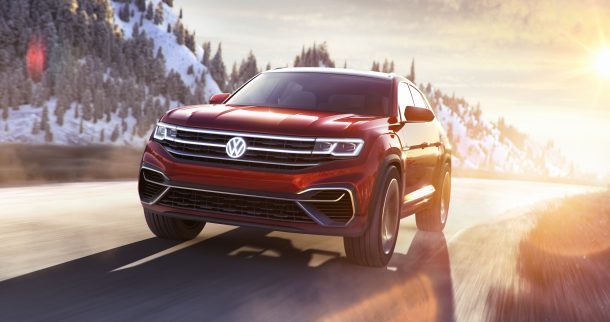
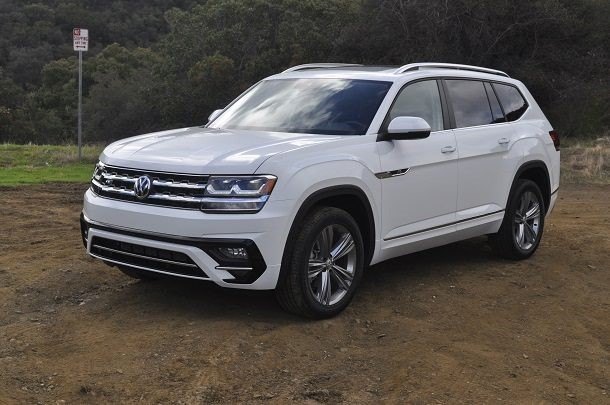
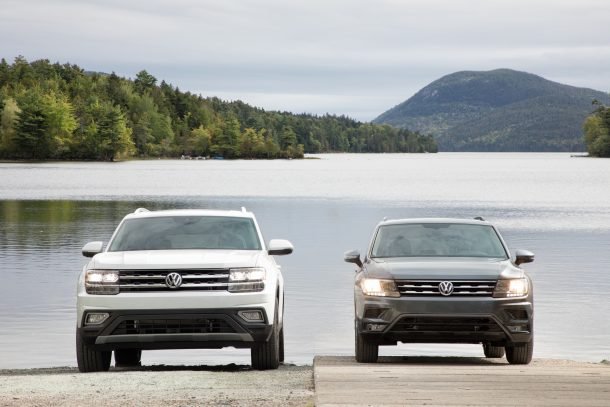

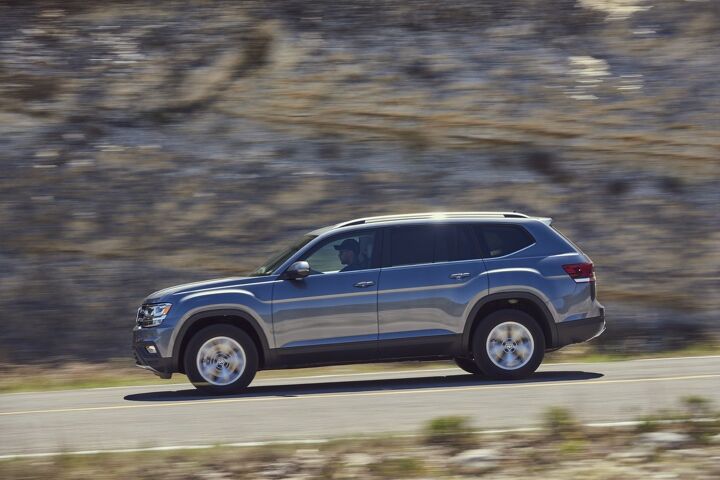

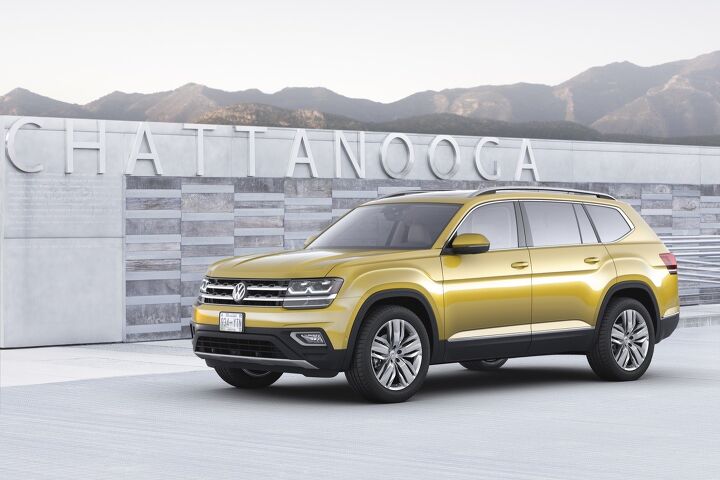



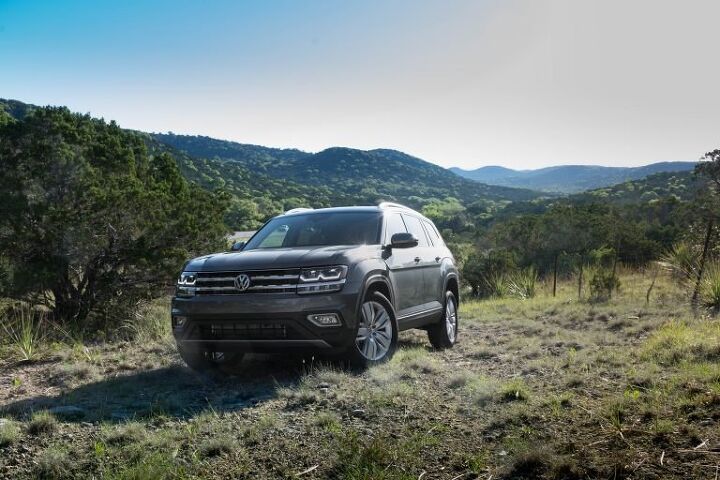
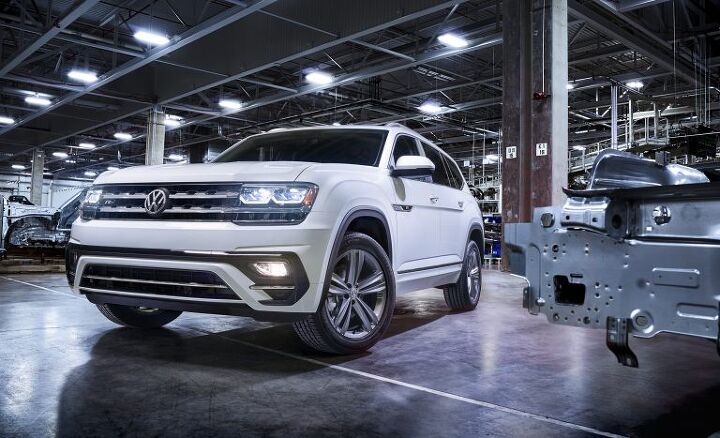
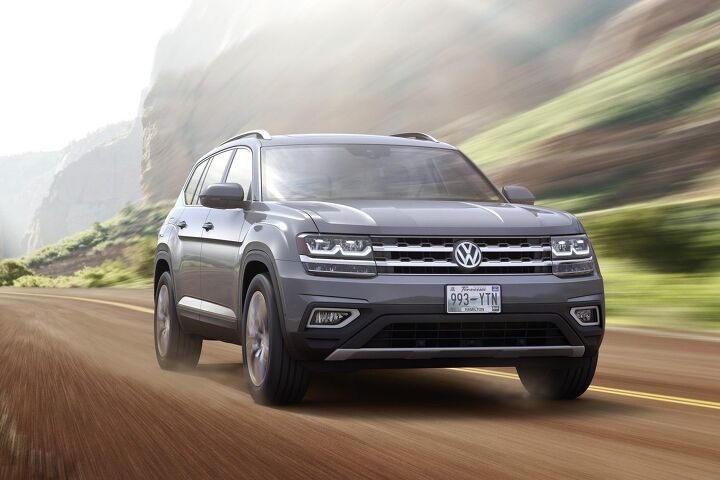













Recent Comments